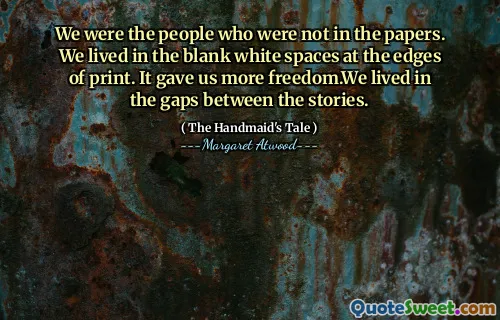...there was little that was truly original or indigenous to Gilead. Its genius was synthesis.
In Margaret Atwood's "The Handmaid's Tale," Gilead is depicted as a society that lacks authentic originality or indigenous culture. Instead, it thrives on the idea of synthesis, taking elements from various sources and reshaping them to serve its purposes. This blending of ideas highlights the way that oppressive regimes can manipulate existing concepts to create a new social order.
The emphasis on synthesis in Gilead serves as a critique of how societies can overlook their originality in favor of constructed identities. Rather than drawing from genuine roots, Gilead's culture is a collage designed to control and suppress, illustrating the dangers of a society that prioritizes conformity over authentic expression.






